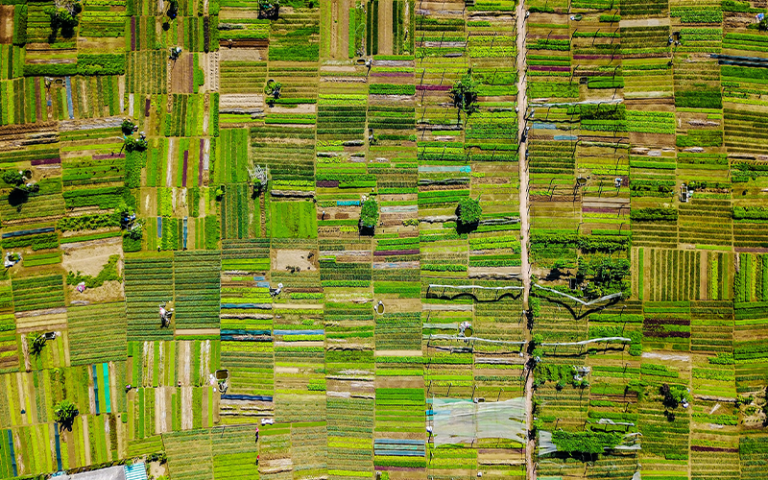For our future food systems, business as usual is not an option
9 December 2021
Ending hunger, ensuring water security, restoring biodiversity whilst tackling the climate crisis is no easy task. Associate Professor Carole Dalin discusses how some of her research at ISR hopes to help achieve this goal.

Food systems are crucial to reach the United Nations’ (UN) 2030 Sustainable Development Goals (SDGs): to end hunger, but also to mitigate and adapt to climate change, to ensure water security, to protect and restore biodiversity, to ensure human health and well-being, to end poverty, and to support sustainable communities.
While hunger has receded – undernourishment decreased from 15 to 10% between 2005 and 2015 and has remained stable since – food systems are causing increasingly severe damage to our environment, and contributing to our overshooting of environmental limits. Indeed, agriculture and associated land use changes are the largest threat to biodiversity, a significant contributor to climate change (21-37% of greenhouse gas emissions), the most water-consuming sector (70% of abstraction, 90% of consumption), and a key source of water pollution via fertilisers.
In 2021, the UN held the first Food Systems Summit, recognising the fundamental importance of food systems not only to eradicate hunger, but also to tackle the pressing challenges of environmental sustainability. Major policy and scientific international organisations, such as the IPCC, OECD and IPBES, have also recognised the vital role of food systems for our lives, economies, and planet, and the urgent need to improve them, notably as part of recovery from the Covid-19 pandemic.
Different platforms, from scientific communities to wider societal and political spheres, are calling for evidence and for solutions based on a systemic approach, that can mitigate trade-offs and maximise co-benefits. Within the theme of Sustainability at the Water-Energy-Food Nexus, ISR is tackling this important challenge by carrying out interdisciplinary research to measure sustainability and to consider important systemic interlinkages, between agriculture and water, biodiversity, energy, human health and climate change. It is essential to consider all major environmental aspects of agricultural sustainability to avoid the unintended consequences of strategies focused on a single aspect.
The FOODIES project, for example, has provided critical improvements in our understanding of the multiple environmental impacts of agriculture (on the climate, water quality and quantity, and land ecosystems) by accounting for different practices and local conditions across the world. This enables a comprehensive assessment of agricultural sustainability, and helps to quantify trade-offs associated with different agricultural management strategies. The research also accounts for the crucial role of trade in global agricultural systems, which led to the development of major export-oriented agricultural regions, by integrating it into the evaluation of potential pathways to achieve environmentally sustainable agriculture.
To effectively progress towards the SDGs, it is necessary to understand the interactions between changes in biodiversity and human food security. While agricultural land use puts pressure on biodiversity, biodiversity changes may also impact food production, because many different species provide important ecosystem services that support agriculture. The BIOTA project is advancing global-scale biodiversity models to explain the interactions between biodiversity change and food production across the globe. This project also investigates how global trade in agricultural products is linked to biodiversity change, by identifying where food consumption has particularly strong biodiversity impacts, measuring the impacts of both trade-related land use and climate change on biodiversity.
Agriculture not only affects the environment, but also our health; indeed, diet-related diseases are increasingly prevalent worldwide. The SHEFS project is a multi-partner research consortium, led by the London School of Hygiene and Tropical Medicine, which analyses the interactions between human health, food and the environment in the UK, South Africa and India. Research and stakeholder engagement activities focus on determining what components of the interactions between environment, food systems and health are critical for achieving sustainable and equitable health outcomes. The project also considers which (inter)sectoral policy options are most able to deliver healthy food systems under future environmental and demographic changes. It also contributes to the co-development of evidence-based policies with stakeholders, with the goal of improving access to sustainable and healthy diets for all.
 Close
Close

